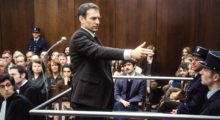Authors — Vadim Rizov
-
Venice Film Festival 2023: Poor Things

Initially, Poor Things seems like it might be a Yorgos Lanthimos provocation about the value of provocation, a suspicion prompted when medical student Max McCandless (Ramy Youssef) first sees Bella Baxter (Emma Stone) and, awestruck, describes her as a “very pretty retard.” Given the film’s steampunk trappings, the 19th-century setting doesn’t offer “period verisimilitude” as a cover for vocabulary that feels suspiciously like a Red Scare shout-out. Bella is seen naked for the first time while unconscious; depending on how you want to take this visual language, the viewer could be aligned with a non-consensual gaze. Learning through transgression turns out to […]
by Vadim Rizov on Sep 1, 2023 -
Locarno 2023: Circles of Reference

Festivals have a baked-in tension between the works they’re meant to showcase—marginal relative to the marketplace, hence the (sometimes pejorative) descriptor “festival film”—and the sponsorships necessary for them to operate, the larger and more corporate the better. Cracks will inevitably emerge; thus, attending Locarno with his latest, The Old Oak, socialist Ken Loach spent part of his press conference dutifully denouncing sponsors UBS Bank, prompting two Swiss journalists sitting next to an attending friend to draw their breath sharply in protest: “UBS is an ethical bank.” Another tension is between the ideal of a “festival film”—work at the boundaries of what’s […]
by Vadim Rizov on Aug 23, 2023 -
Cannes 2023: The Pot-au-Feu, Portraits of Ghosts

To celebrate Cannes is to celebrate film history itself—or at least so the fest would have it. But while there’s certainly meaningful and genuine overlap, any self-venerating mythology is going to breed unwelcome byproducts, as at the premiere of Jean-Luc Godard’s “final” film, Trailer of a Movie That Will Never Exist: “Phony Wars.” (Its actual finality status is TBD, as Goodfellas has more of his work, in whatever form, still to sell.) The short was preceded by a French TV documentary, Godard by Godard, which was fairly useless in part because it ignores half of his life and work while playing the […]
by Vadim Rizov on May 29, 2023 -
Cannes 2023: Anatomy of a Fall, Fallen Leaves

Sandra Hüller enters Justine Triet’s Sybil midway, as the hilariously frazzled director of a European co-production who keeps barking in English while trying to keep the set moving. Hüller’s appearance is unexpected in several ways: a film about a therapist-client relationship suddenly shifts focus to The Shoot From Hell, and while the expected reference point for a European movie shot on an island would be Contempt, Triet instead pays homage to Roberto Rossellini’s Stromboli. Nor is this the film’s final narrative slight-of-hand, as Sibyl‘s final act is a drama about alcoholism—throughout, the thematic emphases are always slightly off from where you’d […]
by Vadim Rizov on May 26, 2023 -
Cannes 2023: Lisandro Alonso on Eureka

Lisandro Alonso’s Eureka, which premiered as a Special Screening at this year’s Cannes, begins as a parodic reworking of the filmmaker’s last feature, 2014’s Jauja. There, Viggo Mortensen played a Danish captain crossing inhospitable Argentinian territory in the 1880s with his daughter (Viilbjørk Malling Agger), while encountering what from his perspective are “natives” to be fearfully avoided; Eureka renders that feature’s “not without my daughter” elements as a black-and-white Western set in an indeterminate any-Western-town of America. Mortensen and Agger are once again father-and-child, but this time he’s a considerably dirtier and more disreputable cowboy type. In impeccable academy-ratio black-and-white with rounded […]
by Vadim Rizov on May 24, 2023 -
Cannes 2023: Asteroid City

The negative talking points around Wes Anderson—too twee, airlessly production-designed, an aesthetic in search of emotions—have metastasized thanks to a wave of AI-generated trailers of movies “in his style” (Lord of the Rings, The Matrix, Star Wars—no, I’m not linking!) that seemingly prove computer fake can be just as bad as the real thing. I wish I could credit the tweet I saw (and should’ve fav’d) which pointed out that maybe part of the reason Anderson’s aesthetic is the only one being repeatedly run through the AI mill is because even a barely-film-literate coder can figure out its basic components, as codified in […]
by Vadim Rizov on May 23, 2023 -
Cannes 2023: About Dry Grasses, The Sweet East

Cannes official competition has grandfathered-in filmmakers—Pedro Almodóvar, the Dardennes, Arnaud Desplechin—who will keep being included no matter what, and Nuri Bilge Ceylan, whose every feature since 2002’s Distant has premiered here, is definitely among them. After receiving the Grand Prix for 2011’s Once Upon a Time in Anatolia, Ceylan introduced his “three-plus-hours only” mode with 2014’s Winter Sleep and 2018’s The Wild Pear Tree, and reception was what you might call “respectfully muted.” Outside the festival, his reputation seems to have fallen off: it’s a long way from the 2007 Coen brothers short World Cinema, in which a cowboy played by Josh Brolin goes to see […]
by Vadim Rizov on May 21, 2023 -
Cannes 2023: The Goldman Case, The Delinquents

On trial in 1975 for three robberies, plus a fourth in which he’s accused of also killing two people, Pierre Goldman (Arieh Worthalter) makes his opening statement, explaining that he’s declining to call any character witnesses because he wants to be judged on the facts rather than emotional appeals. “I will stand before you in my sole innocence,” he declares, “without the pomp or theatricality” that normally accrue themselves to trials, “which disgust me.” This is very funny given that what follows is a true-story courtroom drama of nonstop rhetorical flourishes and screaming matches between opposing counsels, witnesses, the jury […]
by Vadim Rizov on May 19, 2023 -
Cannes 2023: Occupied City

Cannes Film Festival director Thierry Frémaux is not good at playing defense. When asked at Monday’s pre-opening day press conference about an open letter published by (retired) actress Adèle Haenel accusing the festival of protecting “its rapist chiefs,” among them Roman Polanski and Gérard Depardieu, Frémaux responded that “if you thought that it’s a festival for rapists, you wouldn’t be here listening to me, you would not be complaining that you can’t get tickets to get into screenings.” “Festival for rapists” is a clunkily phrased self-own for Frémaux and his subsequent leap to ticketing problems is equally ungainly—but the access problems […]
by Vadim Rizov on May 17, 2023 -
Visions du Réel 2023: Nights Gone By, Linda and Irina, This Woman, Chagrin Valley

Visions du Réel is so punctilious about its nonfiction festival identity that the program booklet explicitly labels the few titles not fitting that (honestly very broad) categorization as “Fiction,” a tag only deployed this year for sidebar retrospectives of Alice Rohrwacher and Lucrecia Martel. For myself, I wanted to attend less because of any particular predilection for nonfiction and more because VdR seems full of stronger iterations of a type of movie I tend to enjoy, roughly categorizable as “relatively well-financed art-leaning European (co)productions”—i.e., I was primarily interested for aesthetic reasons, with the filmmakers chosen for this year’s sidebars illustrative […]
by Vadim Rizov on May 3, 2023










